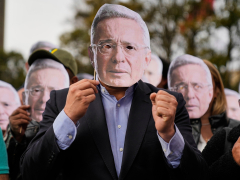Uribe, who denies any wrongdoing, has pledged to appeal following his conviction for witness tampering and bribery.
Published On 1 Aug 2025
Former Colombian President Alvaro Uribe has been sentenced to 12 years of house arrest following his conviction for witness-tampering and bribery, according to local media reports.
The sentencing hearing on Friday also resulted in Uribe, 73, receiving a fine of $578,000 and a ban from serving in public office for 100 months and 20 days — or just over eight years.
He is now required to report to authorities in Rionegro, in his home province of Antioquia. Afterwards, Judge Sandra Liliana Heredia has ordered him to “proceed immediately to his residence where he will comply with house arrest”.
With his conviction on July 28, Uribe has become the first former Colombian president to be found guilty in a criminal trial.
But Uribe’s defence lawyers have already announced that they plan to appeal.
The sentencing culminates a six-month trial and nearly 13 years of legal back-and-forth for the popular conservative leader, who is considered one of the defining forces in modern-day Colombian politics.
His house arrest also comes less than a year before Colombia is set to hold presidential elections in May 2026.

Allegations of human rights abuses
The case centres around Uribe’s role in Colombia’s more than six-decade-long internal conflict, which has seen government forces, right-wing paramilitaries, left-wing rebel groups and drug-trafficking networks all fighting for control over parts of the country.
During his tenure as president from 2002 to 2010, Uribe led a strong-armed offensive against left-wing rebels like the Revolutionary Armed Forces of Colombia (FARC), the largest such group at the time.
But that approach earned him criticism for alleged human rights abuses, which he has denied.
Under his presidency, the Colombian military faced increasing accusations that it was killing civilians to boost the number of enemy fighters it could report as dead.
This practice, known as the “false positives” scandal, has been implicated in the deaths of at least 2,000 people, with experts indicating that the number could be far higher. As many as 6,402 killings have been investigated.
Critics have also questioned Uribe’s ties to right-wing paramilitaries, another allegation the ex-president has rejected.
But more than a decade ago, Uribe took action to silence one of his most prominent critics, left-wing Senator Ivan Cepeda, sparking his current trial.
Cepeda and others had drawn connections between Uribe’s rise in politics in the 1990s and the creation of the paramilitary group Bloque Metro.





